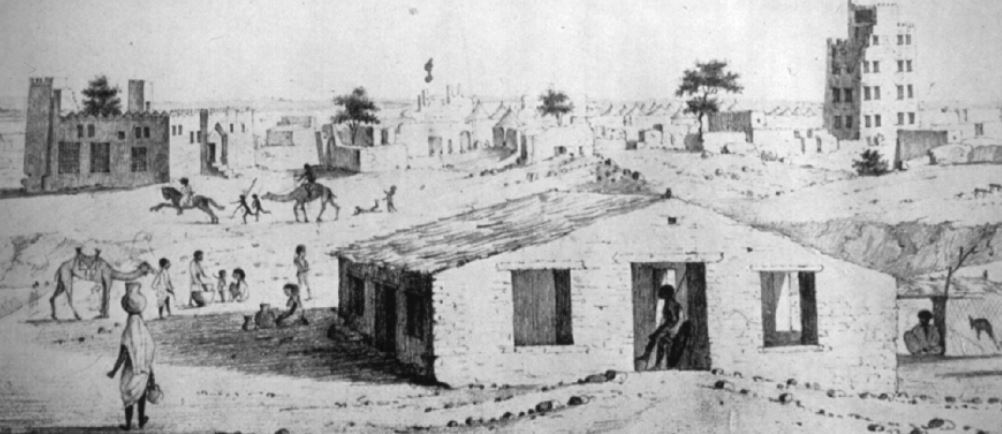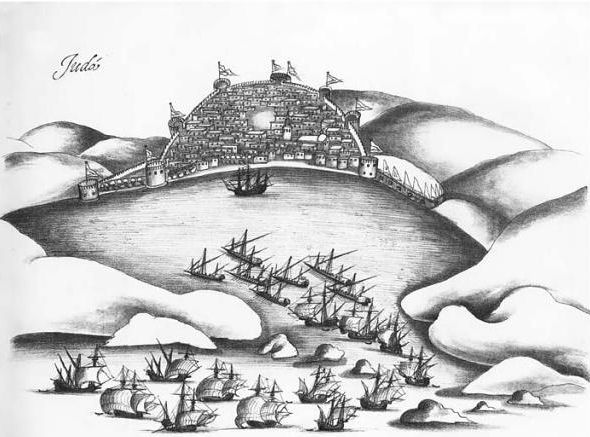|
Amara Dunqas
Amara Dunqas was the first ruler of the Kingdom of Sennar, which he ruled from 1504 - 1533/4. "Dunqas" is an epithet meaning "bent down, with an inclined head", referring to the way of how he required his subjects to approach him. According to James Bruce, he founded the city of Sennar after the Wad 'Ajib had been defeated by the Funj in a battle near Arbaji. Doing this he moved the seat of government of Wad ‘Ajib to Arbaji, that he might be more immediately under their own eye. Following the Ottoman conquest of Egypt in 1517, Amara Dunqas skillfully used diplomacy to keep the Ottoman armies from advancing further up the Nile The Nile (also known as the Nile River or River Nile) is a major north-flowing river in northeastern Africa. It flows into the Mediterranean Sea. The Nile is the longest river in Africa. It has historically been considered the List of river sy ... and conquering his realm, thus securing the future of the kingdom. In 1523 the Jewish traveller D ... [...More Info...] [...Related Items...] OR: [Wikipedia] [Google] [Baidu] [Amazon] |
Kingdom Of Sennar
The Funj Sultanate, also known as Funjistan, Sultanate of Sennar (after its capital Sennar) or Blue Sultanate (due to the traditional Sudanese convention of referring to black people as blue) (), was a monarchy in what is now Sudan, northwestern Eritrea and western Ethiopia. Founded in 1504 by the Funj people, it quickly converted to Islam, although this conversion was only nominal. Until a more orthodox form of Islam took hold in the 18th century, the state remained an "African empire with a Muslim façade". It reached its peak in the late 17th century, but declined and eventually fell apart in the 18th and 19th centuries. In 1821, the last sultan, greatly reduced in power, surrendered to the Ottoman Egyptian invasion without a fight. History Origins Christian Nubia, represented by the two medieval kingdoms of Makuria and Alodia, began to decline from the 12th century. By 1365 Makuria had virtually collapsed and was reduced to a rump state restricted to Lower Nubia, until ... [...More Info...] [...Related Items...] OR: [Wikipedia] [Google] [Baidu] [Amazon] |
James Bruce
James Bruce of Kinnaird (14 December 1730 – 27 April 1794) was a Scottish traveller and travel writer who physically confirmed the source of the Blue Nile. He spent more than a dozen years in North and East Africa and in 1770 became the first European to trace and document the course of the Nile by following it upstream from Egypt through Sudan to its origins in the Blue Nile in Ethiopia. Early life James Bruce was born at the family seat of Kinnaird, Stirlingshire, and educated at Harrow School and Edinburgh University. He began to study for the bar, but his marriage to the daughter of a wine importer and merchant resulted in him entering that business instead. His wife died in October 1754, within nine months of marriage, and Bruce thereafter travelled in Portugal and Spain as part of the wine trade. The examination of oriental manuscripts at the Escorial in Spain led him to the study of Arabic and Geʽez and determined his future career. In 1758, his father's death ... [...More Info...] [...Related Items...] OR: [Wikipedia] [Google] [Baidu] [Amazon] |
Funj
The Funj Sultanate, also known as Funjistan, Sultanate of Sennar (after its capital Sennar) or Blue Sultanate (due to the traditional Sudanese convention of referring to black people as blue) (), was a monarchy in what is now Sudan, northwestern Eritrea and western Ethiopia. Founded in 1504 by the Funj people, it quickly converted to Islam, although this conversion was only nominal. Until a more orthodox form of Islam took hold in the 18th century, the state remained an "African empire with a Muslim façade". It reached its peak in the late 17th century, but declined and eventually fell apart in the 18th and 19th centuries. In 1821, the last sultan, greatly reduced in power, surrendered to the Ottoman Egyptian invasion without a fight. History Origins Christian Nubia, represented by the two medieval kingdoms of Makuria and Alodia, began to decline from the 12th century. By 1365 Makuria had virtually collapsed and was reduced to a rump state restricted to Lower Nubia, until fi ... [...More Info...] [...Related Items...] OR: [Wikipedia] [Google] [Baidu] [Amazon] |
Arbaji
Arbagi, (or Arbaji), formerly Hellet Amara, is a town in Al Jazirah State in Sudan. It lies opposite Rufaa on the left bank of the Blue Nile, 84.5 miles by road and 95 miles by river from Khartoum. There are several villages in the angle of the river which, however, are so close to one another that they may be considered as one. The town of Arbagi includes the site of the ancient city of Arbagi which is one of the oldest sites in the Sudan, and is mentioned by the learned Ludolphus in his history of Abyssinia. It was destroyed by the Shukria early in the 19th or at the end of 18th century. The population of Arbagi is chiefly sawarda Mahasis/Ja'alin The Ja'alin, Ja'aliya, Ja'aliyin or Ja'al () are an Arabs, Arab or Arabised Nubians, Nubian tribe in Sudan. They claim Arab descent. The Ja'alin formerly occupied the country on both banks of the Nile from Khartoum to Abu Hamad; Citation: ''The A ..., Danagla and Batahin. At the turn of the twentieth century, Arbagi was under the O ... [...More Info...] [...Related Items...] OR: [Wikipedia] [Google] [Baidu] [Amazon] |
Ottoman Empire
The Ottoman Empire (), also called the Turkish Empire, was an empire, imperial realm that controlled much of Southeast Europe, West Asia, and North Africa from the 14th to early 20th centuries; it also controlled parts of southeastern Central Europe, between the early 16th and early 18th centuries. The empire emerged from a Anatolian beyliks, ''beylik'', or principality, founded in northwestern Anatolia in by the Turkoman (ethnonym), Turkoman tribal leader Osman I. His successors Ottoman wars in Europe, conquered much of Anatolia and expanded into the Balkans by the mid-14th century, transforming their petty kingdom into a transcontinental empire. The Ottomans ended the Byzantine Empire with the Fall of Constantinople, conquest of Constantinople in 1453 by Mehmed II. With its capital at History of Istanbul#Ottoman Empire, Constantinople (modern-day Istanbul) and control over a significant portion of the Mediterranean Basin, the Ottoman Empire was at the centre of interacti ... [...More Info...] [...Related Items...] OR: [Wikipedia] [Google] [Baidu] [Amazon] |
Egypt
Egypt ( , ), officially the Arab Republic of Egypt, is a country spanning the Northeast Africa, northeast corner of Africa and Western Asia, southwest corner of Asia via the Sinai Peninsula. It is bordered by the Mediterranean Sea to northern coast of Egypt, the north, the Gaza Strip of Palestine and Israel to Egypt–Israel barrier, the northeast, the Red Sea to the east, Sudan to Egypt–Sudan border, the south, and Libya to Egypt–Libya border, the west; the Gulf of Aqaba in the northeast separates Egypt from Jordan and Saudi Arabia. Cairo is the capital, list of cities and towns in Egypt, largest city, and leading cultural center, while Alexandria is the second-largest city and an important hub of industry and tourism. With over 109 million inhabitants, Egypt is the List of African countries by population, third-most populous country in Africa and List of countries and dependencies by population, 15th-most populated in the world. Egypt has one of the longest histories o ... [...More Info...] [...Related Items...] OR: [Wikipedia] [Google] [Baidu] [Amazon] |
Nile
The Nile (also known as the Nile River or River Nile) is a major north-flowing river in northeastern Africa. It flows into the Mediterranean Sea. The Nile is the longest river in Africa. It has historically been considered the List of river systems by length, longest river in the world, though this has been contested by research suggesting that the Amazon River is slightly longer.Amazon Longer Than Nile River, Scientists Say Of the world's major rivers, the Nile has one of the lowest average annual flow rates. About long, its drainage basin covers eleven countries: the Democratic Republic of the Congo, Tanzania, Burundi, Rwanda, Uganda, Kenya, Ethiopia, Eritrea, South Sudan, Sudan, and Egypt. In pa ... [...More Info...] [...Related Items...] OR: [Wikipedia] [Google] [Baidu] [Amazon] |
David Reubeni
David Reubeni (1490–1535/1541?) was a mysterious Jewish "half-mystic, half-adventurer." Reubeni presented military and political plans to various Christian rulers in Europe. His proposals, which combined political-military strategies with eschatological elements, along with his origin and enigmatic personality, remain partially understood. Reubeni managed to secure an audience with king John (João) of Portugal in November 1525, supported by a letter of recommendation from Pope Clement VII. Reubeni consistently asserted that he was the son of the deceased "King Suleiman of Ḥabor" and claimed to have served as the Minister of War for that kingdom, now ruled by his elder brother, King Joseph of Ḥabor. Some scholars regard his claims of nobility as fraud. According to his accounts, this kingdom had 300,000 "Israelite" subjects. Initially, the Portuguese king was intrigued by Reubeni's proposals and agreed to provide Portuguese arms. However, after five months, Reubeni fell int ... [...More Info...] [...Related Items...] OR: [Wikipedia] [Google] [Baidu] [Amazon] |
Selman Reis
Selman Reis was an Ottoman admiral and former corsair who was active in the Mamluk Navy of Egypt and later in the Ottoman Navy against the Portuguese in the first half of the 16th century. Selman Reis was originally from the Aegean island of Lesbos. ''The Ottoman Age of Exploration'' Giancarlo Casale p.39/ref> Mercenary for the Mamluk regime Selman Reis entered the service of the Mamluks, and led a group of 2,000 Levantines, against the wishes of the Ottoman Sultan Selim I. ''The Ottoman Age of Exploration'' Giancarlo Casale p.32/ref> Following the disruption of the spice trade between India and Mamluk Egypt by the Portuguese, Selman Reis led a Mamluk fleet of 19 ships into the Indian Ocean in 1515. He left Suez leading the fleet on 30 September 1515. ''An Economic and Social History of the Ottoman Empire, Volume 1'' by Halil Ä°nalcik p.321''ff''/ref> The fleet also included 3,000 men, 1,300 of whom were Turkish soldiers. The fleet built a fortress in Kamaran, but failed to ... [...More Info...] [...Related Items...] OR: [Wikipedia] [Google] [Baidu] [Amazon] |
Bulletin Of The School Of Oriental And African Studies
Bulletin or The Bulletin may refer to: Periodicals (newspapers, magazines, journals) * ''Bulletin'' (online newspaper), a Swedish online newspaper * ''The Bulletin'' (Australian periodical), an Australian magazine (1880–2008) ** Bulletin Debate, a famous dispute from 1892 to 1893 between Henry Lawson and Banjo Paterson * ''The Bulletin'' (alternative weekly), an alternative weekly published in Montgomery County, Texas, U.S. * ''The Bulletin'' (Bend), a daily newspaper in Bend, Oregon, U.S. * ''The Bulletin'' (Belgian magazine), a weekly English-language magazine published in Brussels, Belgium * ''The Bulletin'' (Philadelphia newspaper), a newspaper in Philadelphia, Pennsylvania, U.S. (2004–2009) * ''The Bulletin'' (Norwich) * ''London Bulletin'', surrealist monthly magazine (1938–1940) * ''The Morning Bulletin'', a daily newspaper published in Rockhampton, Queensland, Australia since 1861 * ''Philadelphia Bulletin'', a newspaper published in Philadelphia, U.S. (1847†... [...More Info...] [...Related Items...] OR: [Wikipedia] [Google] [Baidu] [Amazon] |





